Public Law: Supreme Court's Prorogation Ruling in Miller 2/Cherry Case
VerifiedAdded on 2023/01/13
|13
|4475
|87
Essay
AI Summary
This essay provides a comprehensive analysis of the Supreme Court's ruling in the Miller 2/Cherry case, focusing on the controversial issue of prorogation. It delves into the arguments presented by constitutional law scholars, including the perspectives of Martin Loughlin, who viewed the ruling as a political act, and Mark Elliot, who argued the court fulfilled its constitutional duty. The essay examines the legal background of prorogation, the specific details of the case, and the court's reasoning, supported by relevant academic commentary. It explores the key constitutional principles at stake, such as parliamentary sovereignty and the rule of law. Furthermore, the essay offers a critical evaluation of the differing viewpoints, ultimately arguing which perspective aligns most closely with the principles of constitutional law and the role of the judiciary in upholding them. The analysis also considers the broader implications of the ruling on the UK's political landscape and the balance of power between the executive, legislative, and judicial branches, with references to Brexit and other relevant case studies.
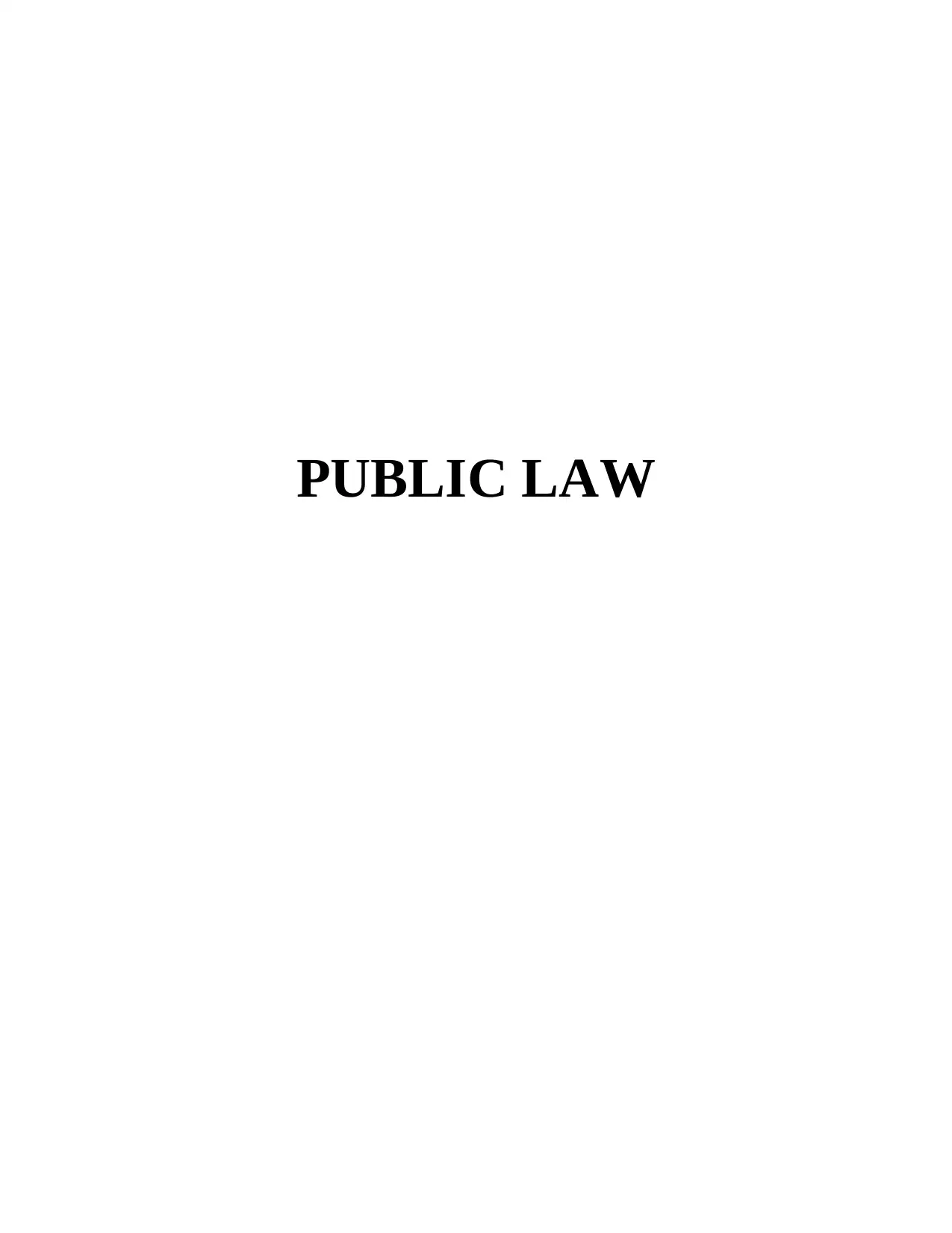
PUBLIC LAW
Paraphrase This Document
Need a fresh take? Get an instant paraphrase of this document with our AI Paraphraser
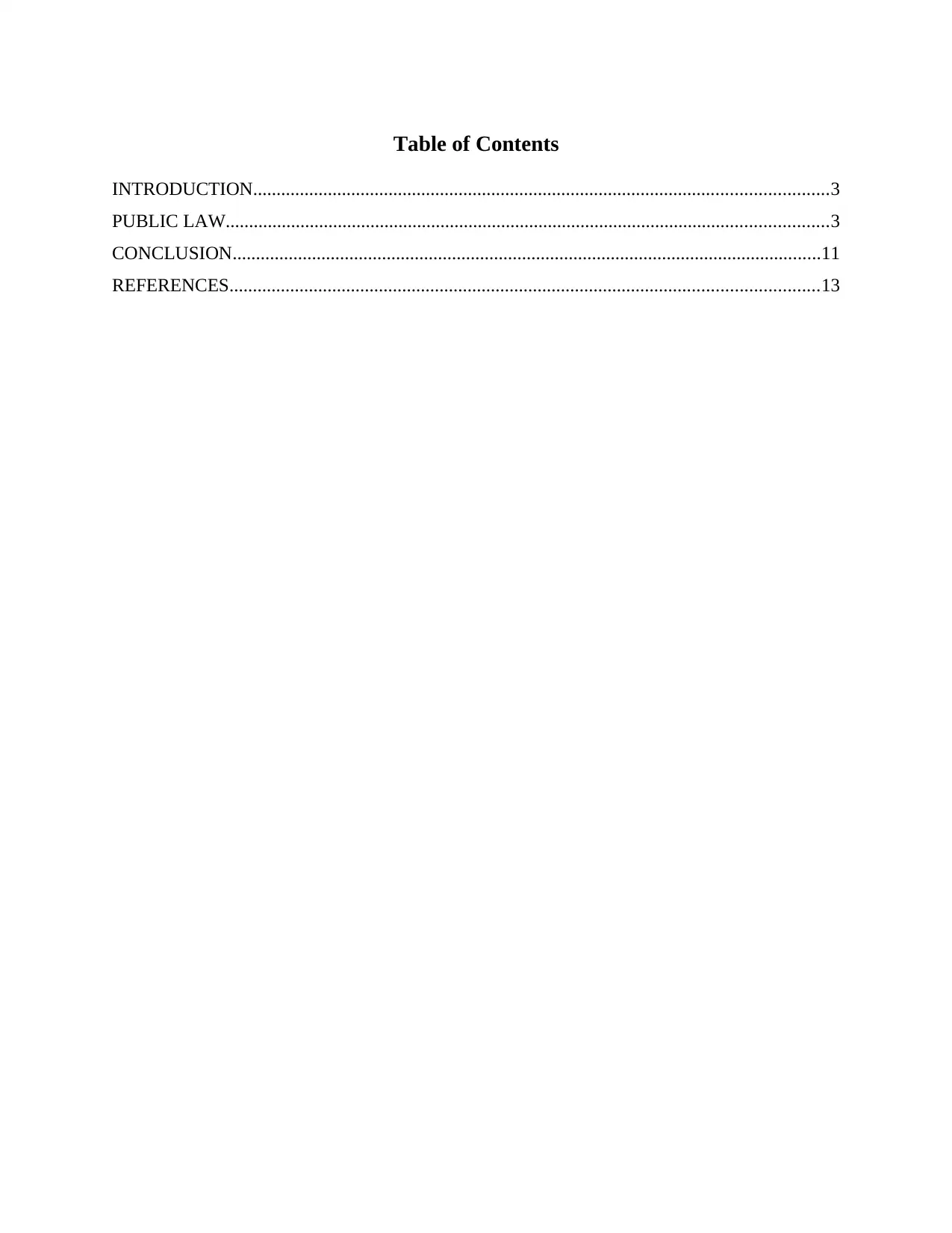
Table of Contents
INTRODUCTION...........................................................................................................................3
PUBLIC LAW.................................................................................................................................3
CONCLUSION..............................................................................................................................11
REFERENCES..............................................................................................................................13
INTRODUCTION...........................................................................................................................3
PUBLIC LAW.................................................................................................................................3
CONCLUSION..............................................................................................................................11
REFERENCES..............................................................................................................................13
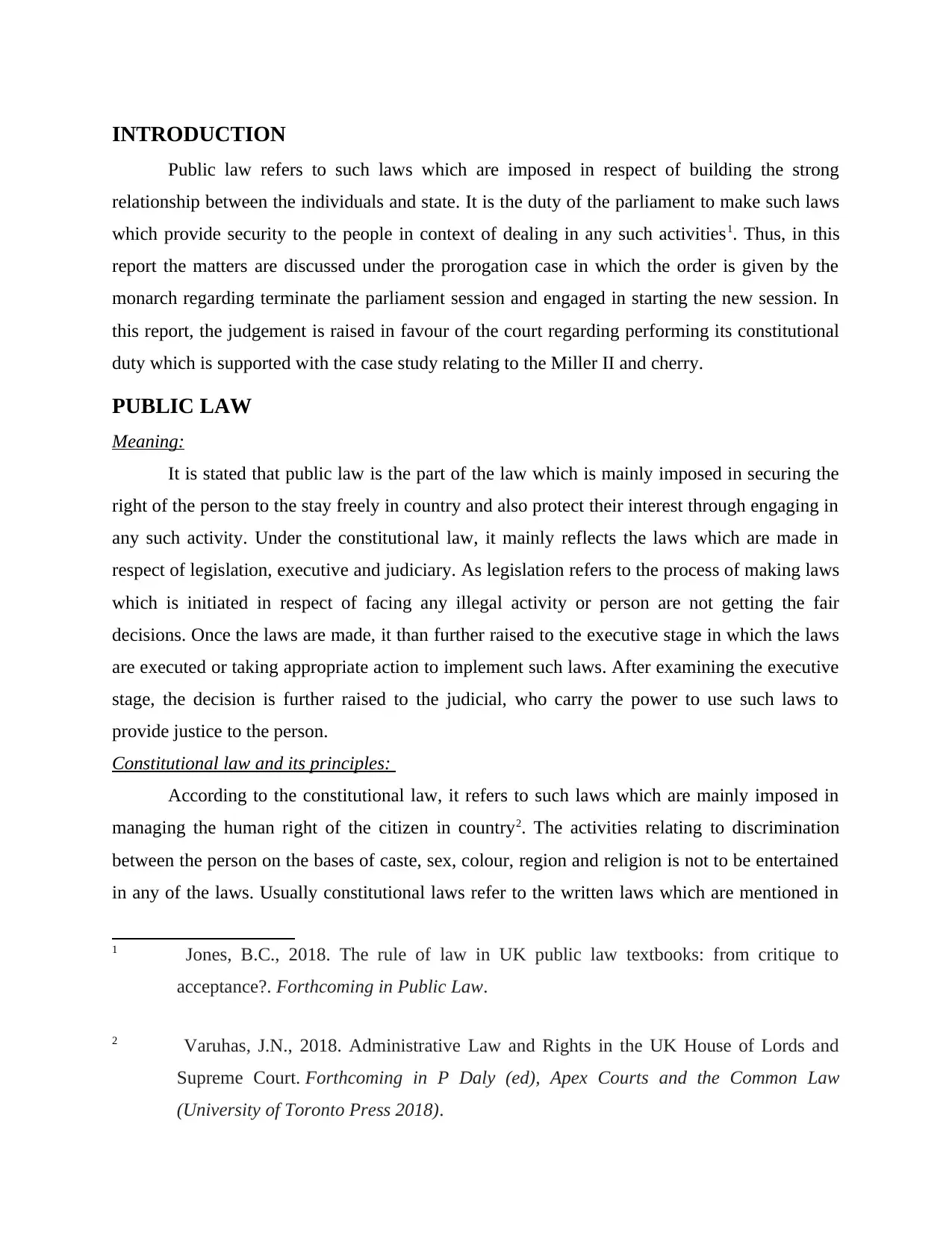
INTRODUCTION
Public law refers to such laws which are imposed in respect of building the strong
relationship between the individuals and state. It is the duty of the parliament to make such laws
which provide security to the people in context of dealing in any such activities1. Thus, in this
report the matters are discussed under the prorogation case in which the order is given by the
monarch regarding terminate the parliament session and engaged in starting the new session. In
this report, the judgement is raised in favour of the court regarding performing its constitutional
duty which is supported with the case study relating to the Miller II and cherry.
PUBLIC LAW
Meaning:
It is stated that public law is the part of the law which is mainly imposed in securing the
right of the person to the stay freely in country and also protect their interest through engaging in
any such activity. Under the constitutional law, it mainly reflects the laws which are made in
respect of legislation, executive and judiciary. As legislation refers to the process of making laws
which is initiated in respect of facing any illegal activity or person are not getting the fair
decisions. Once the laws are made, it than further raised to the executive stage in which the laws
are executed or taking appropriate action to implement such laws. After examining the executive
stage, the decision is further raised to the judicial, who carry the power to use such laws to
provide justice to the person.
Constitutional law and its principles:
According to the constitutional law, it refers to such laws which are mainly imposed in
managing the human right of the citizen in country2. The activities relating to discrimination
between the person on the bases of caste, sex, colour, region and religion is not to be entertained
in any of the laws. Usually constitutional laws refer to the written laws which are mentioned in
1 Jones, B.C., 2018. The rule of law in UK public law textbooks: from critique to
acceptance?. Forthcoming in Public Law.
2 Varuhas, J.N., 2018. Administrative Law and Rights in the UK House of Lords and
Supreme Court. Forthcoming in P Daly (ed), Apex Courts and the Common Law
(University of Toronto Press 2018).
Public law refers to such laws which are imposed in respect of building the strong
relationship between the individuals and state. It is the duty of the parliament to make such laws
which provide security to the people in context of dealing in any such activities1. Thus, in this
report the matters are discussed under the prorogation case in which the order is given by the
monarch regarding terminate the parliament session and engaged in starting the new session. In
this report, the judgement is raised in favour of the court regarding performing its constitutional
duty which is supported with the case study relating to the Miller II and cherry.
PUBLIC LAW
Meaning:
It is stated that public law is the part of the law which is mainly imposed in securing the
right of the person to the stay freely in country and also protect their interest through engaging in
any such activity. Under the constitutional law, it mainly reflects the laws which are made in
respect of legislation, executive and judiciary. As legislation refers to the process of making laws
which is initiated in respect of facing any illegal activity or person are not getting the fair
decisions. Once the laws are made, it than further raised to the executive stage in which the laws
are executed or taking appropriate action to implement such laws. After examining the executive
stage, the decision is further raised to the judicial, who carry the power to use such laws to
provide justice to the person.
Constitutional law and its principles:
According to the constitutional law, it refers to such laws which are mainly imposed in
managing the human right of the citizen in country2. The activities relating to discrimination
between the person on the bases of caste, sex, colour, region and religion is not to be entertained
in any of the laws. Usually constitutional laws refer to the written laws which are mentioned in
1 Jones, B.C., 2018. The rule of law in UK public law textbooks: from critique to
acceptance?. Forthcoming in Public Law.
2 Varuhas, J.N., 2018. Administrative Law and Rights in the UK House of Lords and
Supreme Court. Forthcoming in P Daly (ed), Apex Courts and the Common Law
(University of Toronto Press 2018).
⊘ This is a preview!⊘
Do you want full access?
Subscribe today to unlock all pages.

Trusted by 1+ million students worldwide
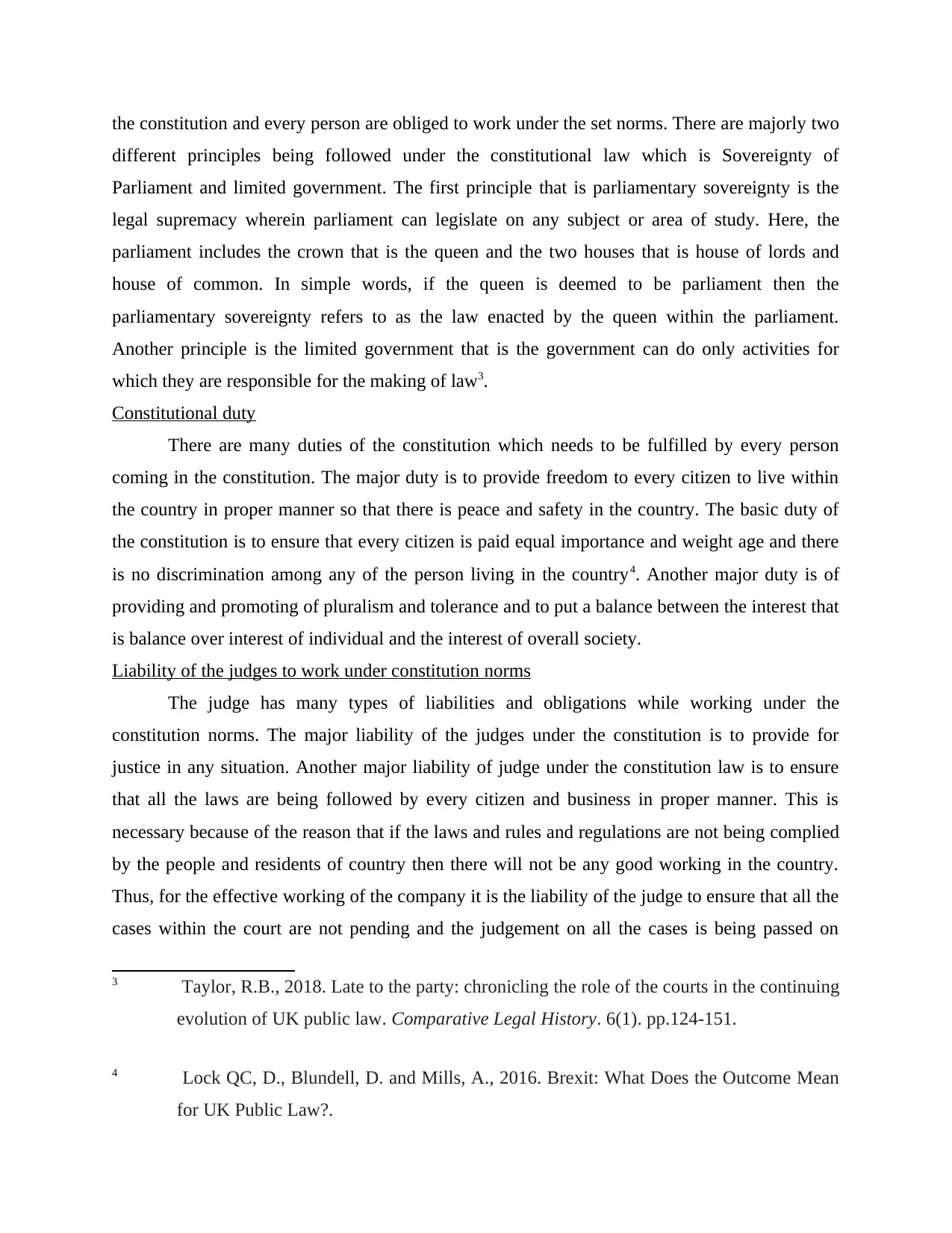
the constitution and every person are obliged to work under the set norms. There are majorly two
different principles being followed under the constitutional law which is Sovereignty of
Parliament and limited government. The first principle that is parliamentary sovereignty is the
legal supremacy wherein parliament can legislate on any subject or area of study. Here, the
parliament includes the crown that is the queen and the two houses that is house of lords and
house of common. In simple words, if the queen is deemed to be parliament then the
parliamentary sovereignty refers to as the law enacted by the queen within the parliament.
Another principle is the limited government that is the government can do only activities for
which they are responsible for the making of law3.
Constitutional duty
There are many duties of the constitution which needs to be fulfilled by every person
coming in the constitution. The major duty is to provide freedom to every citizen to live within
the country in proper manner so that there is peace and safety in the country. The basic duty of
the constitution is to ensure that every citizen is paid equal importance and weight age and there
is no discrimination among any of the person living in the country4. Another major duty is of
providing and promoting of pluralism and tolerance and to put a balance between the interest that
is balance over interest of individual and the interest of overall society.
Liability of the judges to work under constitution norms
The judge has many types of liabilities and obligations while working under the
constitution norms. The major liability of the judges under the constitution is to provide for
justice in any situation. Another major liability of judge under the constitution law is to ensure
that all the laws are being followed by every citizen and business in proper manner. This is
necessary because of the reason that if the laws and rules and regulations are not being complied
by the people and residents of country then there will not be any good working in the country.
Thus, for the effective working of the company it is the liability of the judge to ensure that all the
cases within the court are not pending and the judgement on all the cases is being passed on
3 Taylor, R.B., 2018. Late to the party: chronicling the role of the courts in the continuing
evolution of UK public law. Comparative Legal History. 6(1). pp.124-151.
4 Lock QC, D., Blundell, D. and Mills, A., 2016. Brexit: What Does the Outcome Mean
for UK Public Law?.
different principles being followed under the constitutional law which is Sovereignty of
Parliament and limited government. The first principle that is parliamentary sovereignty is the
legal supremacy wherein parliament can legislate on any subject or area of study. Here, the
parliament includes the crown that is the queen and the two houses that is house of lords and
house of common. In simple words, if the queen is deemed to be parliament then the
parliamentary sovereignty refers to as the law enacted by the queen within the parliament.
Another principle is the limited government that is the government can do only activities for
which they are responsible for the making of law3.
Constitutional duty
There are many duties of the constitution which needs to be fulfilled by every person
coming in the constitution. The major duty is to provide freedom to every citizen to live within
the country in proper manner so that there is peace and safety in the country. The basic duty of
the constitution is to ensure that every citizen is paid equal importance and weight age and there
is no discrimination among any of the person living in the country4. Another major duty is of
providing and promoting of pluralism and tolerance and to put a balance between the interest that
is balance over interest of individual and the interest of overall society.
Liability of the judges to work under constitution norms
The judge has many types of liabilities and obligations while working under the
constitution norms. The major liability of the judges under the constitution is to provide for
justice in any situation. Another major liability of judge under the constitution law is to ensure
that all the laws are being followed by every citizen and business in proper manner. This is
necessary because of the reason that if the laws and rules and regulations are not being complied
by the people and residents of country then there will not be any good working in the country.
Thus, for the effective working of the company it is the liability of the judge to ensure that all the
cases within the court are not pending and the judgement on all the cases is being passed on
3 Taylor, R.B., 2018. Late to the party: chronicling the role of the courts in the continuing
evolution of UK public law. Comparative Legal History. 6(1). pp.124-151.
4 Lock QC, D., Blundell, D. and Mills, A., 2016. Brexit: What Does the Outcome Mean
for UK Public Law?.
Paraphrase This Document
Need a fresh take? Get an instant paraphrase of this document with our AI Paraphraser
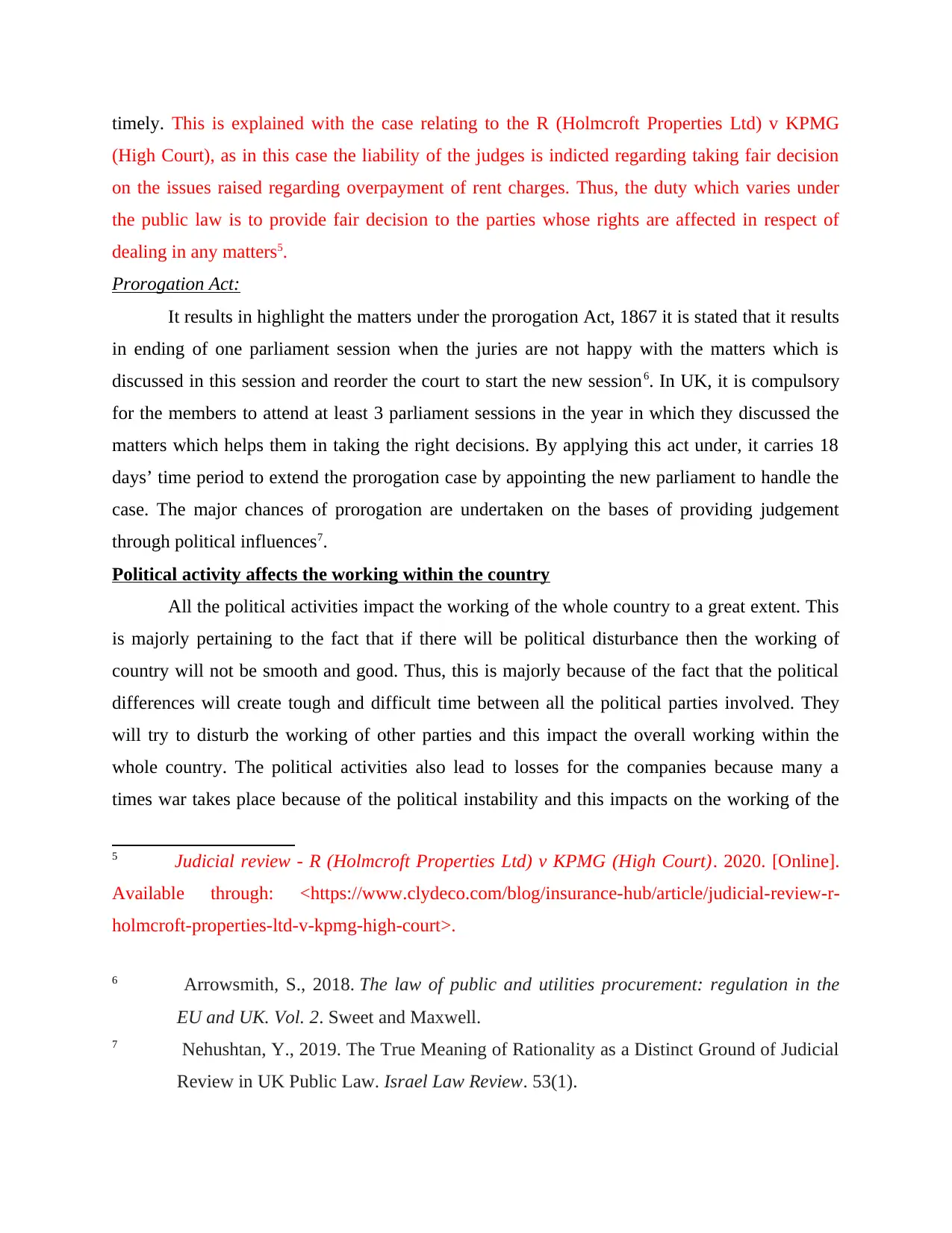
timely. This is explained with the case relating to the R (Holmcroft Properties Ltd) v KPMG
(High Court), as in this case the liability of the judges is indicted regarding taking fair decision
on the issues raised regarding overpayment of rent charges. Thus, the duty which varies under
the public law is to provide fair decision to the parties whose rights are affected in respect of
dealing in any matters5.
Prorogation Act:
It results in highlight the matters under the prorogation Act, 1867 it is stated that it results
in ending of one parliament session when the juries are not happy with the matters which is
discussed in this session and reorder the court to start the new session6. In UK, it is compulsory
for the members to attend at least 3 parliament sessions in the year in which they discussed the
matters which helps them in taking the right decisions. By applying this act under, it carries 18
days’ time period to extend the prorogation case by appointing the new parliament to handle the
case. The major chances of prorogation are undertaken on the bases of providing judgement
through political influences7.
Political activity affects the working within the country
All the political activities impact the working of the whole country to a great extent. This
is majorly pertaining to the fact that if there will be political disturbance then the working of
country will not be smooth and good. Thus, this is majorly because of the fact that the political
differences will create tough and difficult time between all the political parties involved. They
will try to disturb the working of other parties and this impact the overall working within the
whole country. The political activities also lead to losses for the companies because many a
times war takes place because of the political instability and this impacts on the working of the
5 Judicial review - R (Holmcroft Properties Ltd) v KPMG (High Court). 2020. [Online].
Available through: <https://www.clydeco.com/blog/insurance-hub/article/judicial-review-r-
holmcroft-properties-ltd-v-kpmg-high-court>.
6 Arrowsmith, S., 2018. The law of public and utilities procurement: regulation in the
EU and UK. Vol. 2. Sweet and Maxwell.
7 Nehushtan, Y., 2019. The True Meaning of Rationality as a Distinct Ground of Judicial
Review in UK Public Law. Israel Law Review. 53(1).
(High Court), as in this case the liability of the judges is indicted regarding taking fair decision
on the issues raised regarding overpayment of rent charges. Thus, the duty which varies under
the public law is to provide fair decision to the parties whose rights are affected in respect of
dealing in any matters5.
Prorogation Act:
It results in highlight the matters under the prorogation Act, 1867 it is stated that it results
in ending of one parliament session when the juries are not happy with the matters which is
discussed in this session and reorder the court to start the new session6. In UK, it is compulsory
for the members to attend at least 3 parliament sessions in the year in which they discussed the
matters which helps them in taking the right decisions. By applying this act under, it carries 18
days’ time period to extend the prorogation case by appointing the new parliament to handle the
case. The major chances of prorogation are undertaken on the bases of providing judgement
through political influences7.
Political activity affects the working within the country
All the political activities impact the working of the whole country to a great extent. This
is majorly pertaining to the fact that if there will be political disturbance then the working of
country will not be smooth and good. Thus, this is majorly because of the fact that the political
differences will create tough and difficult time between all the political parties involved. They
will try to disturb the working of other parties and this impact the overall working within the
whole country. The political activities also lead to losses for the companies because many a
times war takes place because of the political instability and this impacts on the working of the
5 Judicial review - R (Holmcroft Properties Ltd) v KPMG (High Court). 2020. [Online].
Available through: <https://www.clydeco.com/blog/insurance-hub/article/judicial-review-r-
holmcroft-properties-ltd-v-kpmg-high-court>.
6 Arrowsmith, S., 2018. The law of public and utilities procurement: regulation in the
EU and UK. Vol. 2. Sweet and Maxwell.
7 Nehushtan, Y., 2019. The True Meaning of Rationality as a Distinct Ground of Judicial
Review in UK Public Law. Israel Law Review. 53(1).
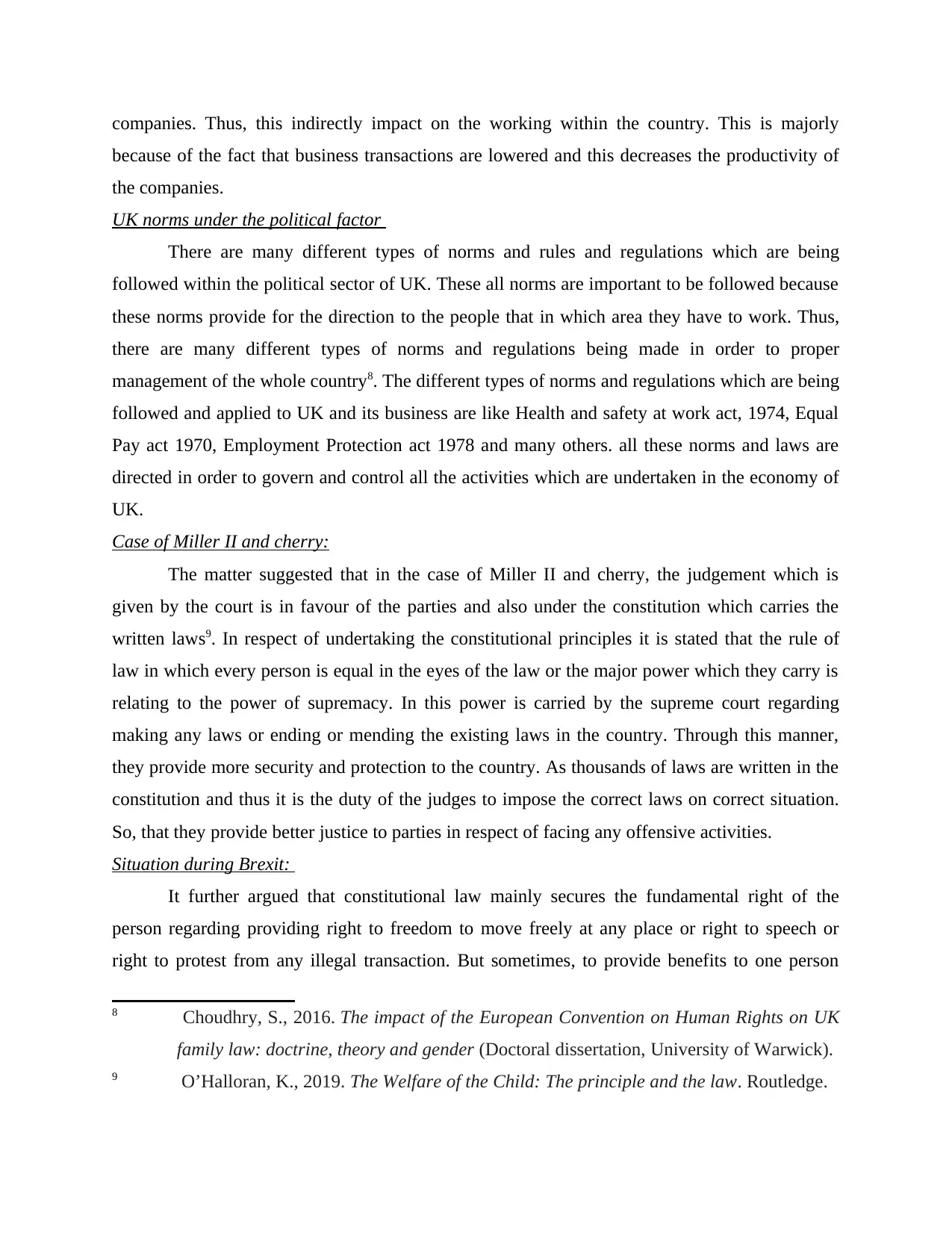
companies. Thus, this indirectly impact on the working within the country. This is majorly
because of the fact that business transactions are lowered and this decreases the productivity of
the companies.
UK norms under the political factor
There are many different types of norms and rules and regulations which are being
followed within the political sector of UK. These all norms are important to be followed because
these norms provide for the direction to the people that in which area they have to work. Thus,
there are many different types of norms and regulations being made in order to proper
management of the whole country8. The different types of norms and regulations which are being
followed and applied to UK and its business are like Health and safety at work act, 1974, Equal
Pay act 1970, Employment Protection act 1978 and many others. all these norms and laws are
directed in order to govern and control all the activities which are undertaken in the economy of
UK.
Case of Miller II and cherry:
The matter suggested that in the case of Miller II and cherry, the judgement which is
given by the court is in favour of the parties and also under the constitution which carries the
written laws9. In respect of undertaking the constitutional principles it is stated that the rule of
law in which every person is equal in the eyes of the law or the major power which they carry is
relating to the power of supremacy. In this power is carried by the supreme court regarding
making any laws or ending or mending the existing laws in the country. Through this manner,
they provide more security and protection to the country. As thousands of laws are written in the
constitution and thus it is the duty of the judges to impose the correct laws on correct situation.
So, that they provide better justice to parties in respect of facing any offensive activities.
Situation during Brexit:
It further argued that constitutional law mainly secures the fundamental right of the
person regarding providing right to freedom to move freely at any place or right to speech or
right to protest from any illegal transaction. But sometimes, to provide benefits to one person
8 Choudhry, S., 2016. The impact of the European Convention on Human Rights on UK
family law: doctrine, theory and gender (Doctoral dissertation, University of Warwick).
9 O’Halloran, K., 2019. The Welfare of the Child: The principle and the law. Routledge.
because of the fact that business transactions are lowered and this decreases the productivity of
the companies.
UK norms under the political factor
There are many different types of norms and rules and regulations which are being
followed within the political sector of UK. These all norms are important to be followed because
these norms provide for the direction to the people that in which area they have to work. Thus,
there are many different types of norms and regulations being made in order to proper
management of the whole country8. The different types of norms and regulations which are being
followed and applied to UK and its business are like Health and safety at work act, 1974, Equal
Pay act 1970, Employment Protection act 1978 and many others. all these norms and laws are
directed in order to govern and control all the activities which are undertaken in the economy of
UK.
Case of Miller II and cherry:
The matter suggested that in the case of Miller II and cherry, the judgement which is
given by the court is in favour of the parties and also under the constitution which carries the
written laws9. In respect of undertaking the constitutional principles it is stated that the rule of
law in which every person is equal in the eyes of the law or the major power which they carry is
relating to the power of supremacy. In this power is carried by the supreme court regarding
making any laws or ending or mending the existing laws in the country. Through this manner,
they provide more security and protection to the country. As thousands of laws are written in the
constitution and thus it is the duty of the judges to impose the correct laws on correct situation.
So, that they provide better justice to parties in respect of facing any offensive activities.
Situation during Brexit:
It further argued that constitutional law mainly secures the fundamental right of the
person regarding providing right to freedom to move freely at any place or right to speech or
right to protest from any illegal transaction. But sometimes, to provide benefits to one person
8 Choudhry, S., 2016. The impact of the European Convention on Human Rights on UK
family law: doctrine, theory and gender (Doctoral dissertation, University of Warwick).
9 O’Halloran, K., 2019. The Welfare of the Child: The principle and the law. Routledge.
⊘ This is a preview!⊘
Do you want full access?
Subscribe today to unlock all pages.

Trusted by 1+ million students worldwide
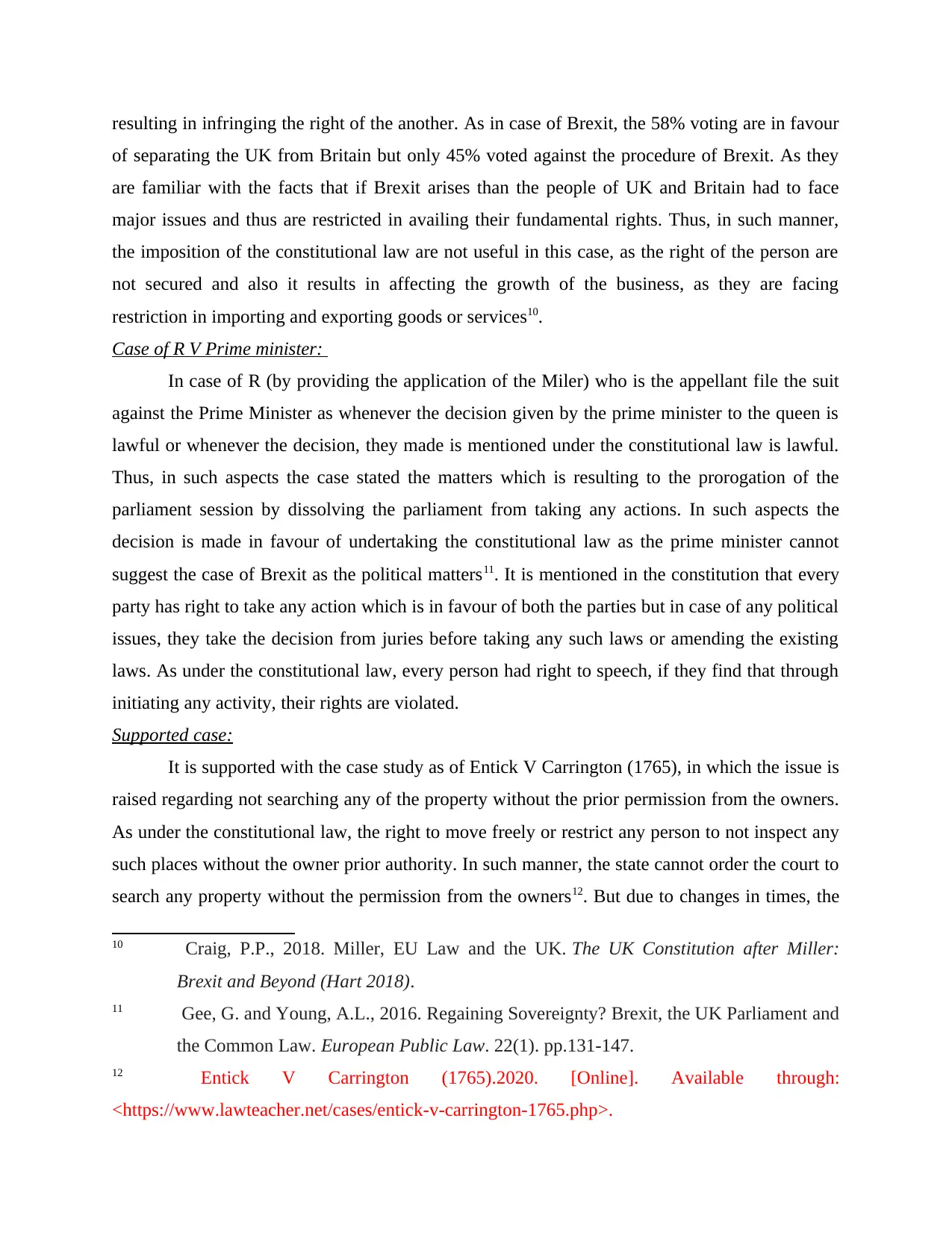
resulting in infringing the right of the another. As in case of Brexit, the 58% voting are in favour
of separating the UK from Britain but only 45% voted against the procedure of Brexit. As they
are familiar with the facts that if Brexit arises than the people of UK and Britain had to face
major issues and thus are restricted in availing their fundamental rights. Thus, in such manner,
the imposition of the constitutional law are not useful in this case, as the right of the person are
not secured and also it results in affecting the growth of the business, as they are facing
restriction in importing and exporting goods or services10.
Case of R V Prime minister:
In case of R (by providing the application of the Miler) who is the appellant file the suit
against the Prime Minister as whenever the decision given by the prime minister to the queen is
lawful or whenever the decision, they made is mentioned under the constitutional law is lawful.
Thus, in such aspects the case stated the matters which is resulting to the prorogation of the
parliament session by dissolving the parliament from taking any actions. In such aspects the
decision is made in favour of undertaking the constitutional law as the prime minister cannot
suggest the case of Brexit as the political matters11. It is mentioned in the constitution that every
party has right to take any action which is in favour of both the parties but in case of any political
issues, they take the decision from juries before taking any such laws or amending the existing
laws. As under the constitutional law, every person had right to speech, if they find that through
initiating any activity, their rights are violated.
Supported case:
It is supported with the case study as of Entick V Carrington (1765), in which the issue is
raised regarding not searching any of the property without the prior permission from the owners.
As under the constitutional law, the right to move freely or restrict any person to not inspect any
such places without the owner prior authority. In such manner, the state cannot order the court to
search any property without the permission from the owners12. But due to changes in times, the
10 Craig, P.P., 2018. Miller, EU Law and the UK. The UK Constitution after Miller:
Brexit and Beyond (Hart 2018).
11 Gee, G. and Young, A.L., 2016. Regaining Sovereignty? Brexit, the UK Parliament and
the Common Law. European Public Law. 22(1). pp.131-147.
12 Entick V Carrington (1765).2020. [Online]. Available through:
<https://www.lawteacher.net/cases/entick-v-carrington-1765.php>.
of separating the UK from Britain but only 45% voted against the procedure of Brexit. As they
are familiar with the facts that if Brexit arises than the people of UK and Britain had to face
major issues and thus are restricted in availing their fundamental rights. Thus, in such manner,
the imposition of the constitutional law are not useful in this case, as the right of the person are
not secured and also it results in affecting the growth of the business, as they are facing
restriction in importing and exporting goods or services10.
Case of R V Prime minister:
In case of R (by providing the application of the Miler) who is the appellant file the suit
against the Prime Minister as whenever the decision given by the prime minister to the queen is
lawful or whenever the decision, they made is mentioned under the constitutional law is lawful.
Thus, in such aspects the case stated the matters which is resulting to the prorogation of the
parliament session by dissolving the parliament from taking any actions. In such aspects the
decision is made in favour of undertaking the constitutional law as the prime minister cannot
suggest the case of Brexit as the political matters11. It is mentioned in the constitution that every
party has right to take any action which is in favour of both the parties but in case of any political
issues, they take the decision from juries before taking any such laws or amending the existing
laws. As under the constitutional law, every person had right to speech, if they find that through
initiating any activity, their rights are violated.
Supported case:
It is supported with the case study as of Entick V Carrington (1765), in which the issue is
raised regarding not searching any of the property without the prior permission from the owners.
As under the constitutional law, the right to move freely or restrict any person to not inspect any
such places without the owner prior authority. In such manner, the state cannot order the court to
search any property without the permission from the owners12. But due to changes in times, the
10 Craig, P.P., 2018. Miller, EU Law and the UK. The UK Constitution after Miller:
Brexit and Beyond (Hart 2018).
11 Gee, G. and Young, A.L., 2016. Regaining Sovereignty? Brexit, the UK Parliament and
the Common Law. European Public Law. 22(1). pp.131-147.
12 Entick V Carrington (1765).2020. [Online]. Available through:
<https://www.lawteacher.net/cases/entick-v-carrington-1765.php>.
Paraphrase This Document
Need a fresh take? Get an instant paraphrase of this document with our AI Paraphraser
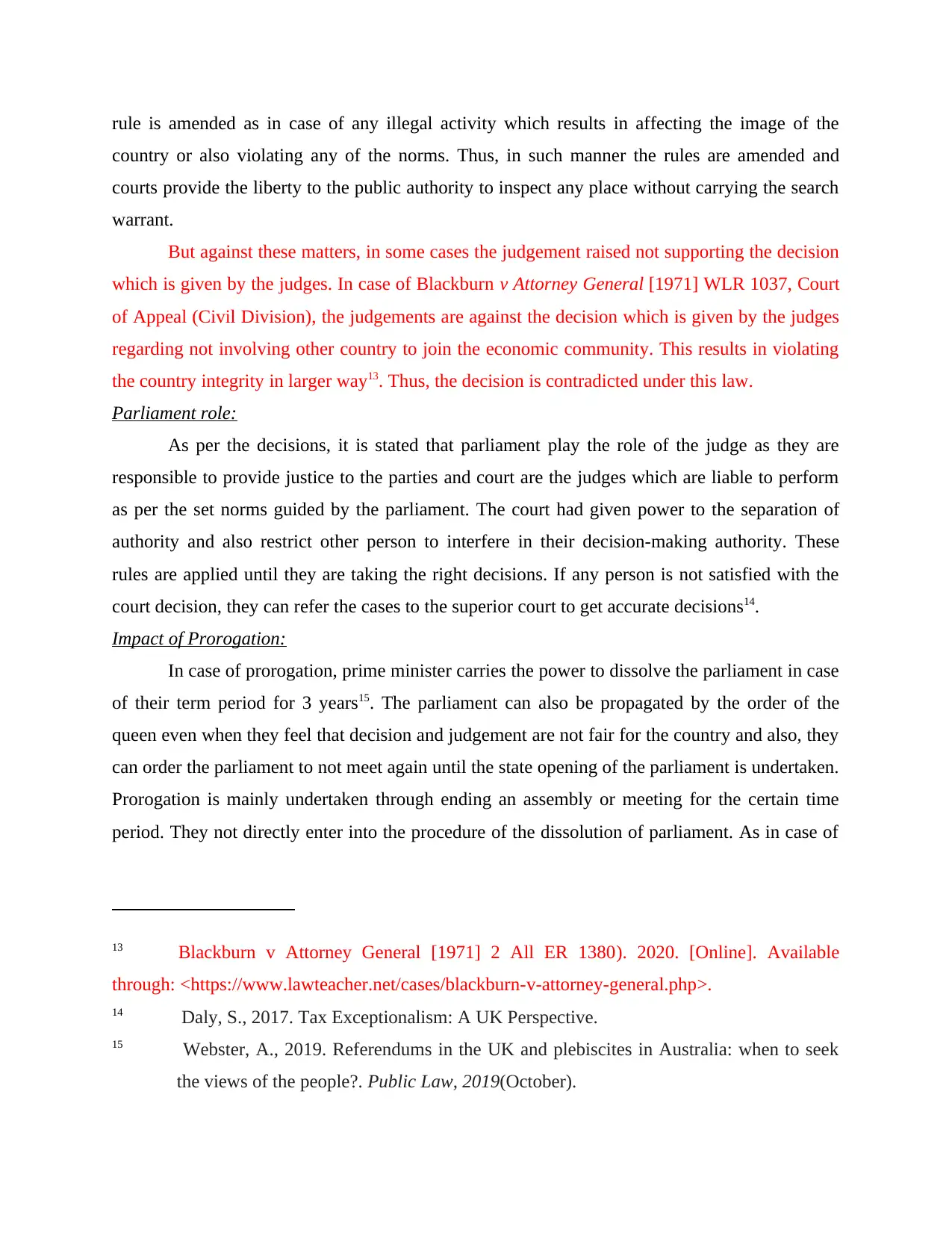
rule is amended as in case of any illegal activity which results in affecting the image of the
country or also violating any of the norms. Thus, in such manner the rules are amended and
courts provide the liberty to the public authority to inspect any place without carrying the search
warrant.
But against these matters, in some cases the judgement raised not supporting the decision
which is given by the judges. In case of Blackburn v Attorney General [1971] WLR 1037, Court
of Appeal (Civil Division), the judgements are against the decision which is given by the judges
regarding not involving other country to join the economic community. This results in violating
the country integrity in larger way13. Thus, the decision is contradicted under this law.
Parliament role:
As per the decisions, it is stated that parliament play the role of the judge as they are
responsible to provide justice to the parties and court are the judges which are liable to perform
as per the set norms guided by the parliament. The court had given power to the separation of
authority and also restrict other person to interfere in their decision-making authority. These
rules are applied until they are taking the right decisions. If any person is not satisfied with the
court decision, they can refer the cases to the superior court to get accurate decisions14.
Impact of Prorogation:
In case of prorogation, prime minister carries the power to dissolve the parliament in case
of their term period for 3 years15. The parliament can also be propagated by the order of the
queen even when they feel that decision and judgement are not fair for the country and also, they
can order the parliament to not meet again until the state opening of the parliament is undertaken.
Prorogation is mainly undertaken through ending an assembly or meeting for the certain time
period. They not directly enter into the procedure of the dissolution of parliament. As in case of
13 Blackburn v Attorney General [1971] 2 All ER 1380). 2020. [Online]. Available
through: <https://www.lawteacher.net/cases/blackburn-v-attorney-general.php>.
14 Daly, S., 2017. Tax Exceptionalism: A UK Perspective.
15 Webster, A., 2019. Referendums in the UK and plebiscites in Australia: when to seek
the views of the people?. Public Law, 2019(October).
country or also violating any of the norms. Thus, in such manner the rules are amended and
courts provide the liberty to the public authority to inspect any place without carrying the search
warrant.
But against these matters, in some cases the judgement raised not supporting the decision
which is given by the judges. In case of Blackburn v Attorney General [1971] WLR 1037, Court
of Appeal (Civil Division), the judgements are against the decision which is given by the judges
regarding not involving other country to join the economic community. This results in violating
the country integrity in larger way13. Thus, the decision is contradicted under this law.
Parliament role:
As per the decisions, it is stated that parliament play the role of the judge as they are
responsible to provide justice to the parties and court are the judges which are liable to perform
as per the set norms guided by the parliament. The court had given power to the separation of
authority and also restrict other person to interfere in their decision-making authority. These
rules are applied until they are taking the right decisions. If any person is not satisfied with the
court decision, they can refer the cases to the superior court to get accurate decisions14.
Impact of Prorogation:
In case of prorogation, prime minister carries the power to dissolve the parliament in case
of their term period for 3 years15. The parliament can also be propagated by the order of the
queen even when they feel that decision and judgement are not fair for the country and also, they
can order the parliament to not meet again until the state opening of the parliament is undertaken.
Prorogation is mainly undertaken through ending an assembly or meeting for the certain time
period. They not directly enter into the procedure of the dissolution of parliament. As in case of
13 Blackburn v Attorney General [1971] 2 All ER 1380). 2020. [Online]. Available
through: <https://www.lawteacher.net/cases/blackburn-v-attorney-general.php>.
14 Daly, S., 2017. Tax Exceptionalism: A UK Perspective.
15 Webster, A., 2019. Referendums in the UK and plebiscites in Australia: when to seek
the views of the people?. Public Law, 2019(October).
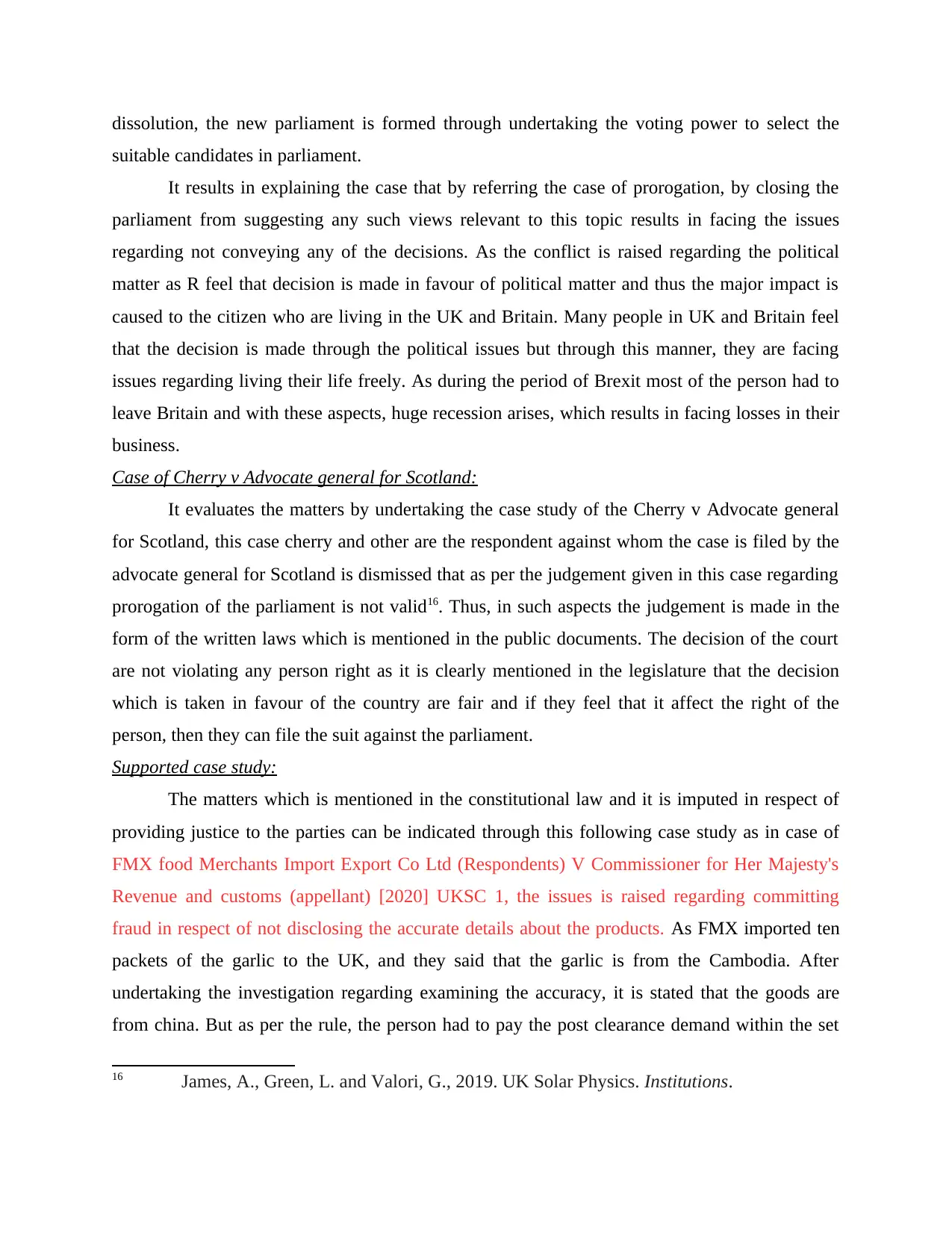
dissolution, the new parliament is formed through undertaking the voting power to select the
suitable candidates in parliament.
It results in explaining the case that by referring the case of prorogation, by closing the
parliament from suggesting any such views relevant to this topic results in facing the issues
regarding not conveying any of the decisions. As the conflict is raised regarding the political
matter as R feel that decision is made in favour of political matter and thus the major impact is
caused to the citizen who are living in the UK and Britain. Many people in UK and Britain feel
that the decision is made through the political issues but through this manner, they are facing
issues regarding living their life freely. As during the period of Brexit most of the person had to
leave Britain and with these aspects, huge recession arises, which results in facing losses in their
business.
Case of Cherry v Advocate general for Scotland:
It evaluates the matters by undertaking the case study of the Cherry v Advocate general
for Scotland, this case cherry and other are the respondent against whom the case is filed by the
advocate general for Scotland is dismissed that as per the judgement given in this case regarding
prorogation of the parliament is not valid16. Thus, in such aspects the judgement is made in the
form of the written laws which is mentioned in the public documents. The decision of the court
are not violating any person right as it is clearly mentioned in the legislature that the decision
which is taken in favour of the country are fair and if they feel that it affect the right of the
person, then they can file the suit against the parliament.
Supported case study:
The matters which is mentioned in the constitutional law and it is imputed in respect of
providing justice to the parties can be indicated through this following case study as in case of
FMX food Merchants Import Export Co Ltd (Respondents) V Commissioner for Her Majesty's
Revenue and customs (appellant) [2020] UKSC 1, the issues is raised regarding committing
fraud in respect of not disclosing the accurate details about the products. As FMX imported ten
packets of the garlic to the UK, and they said that the garlic is from the Cambodia. After
undertaking the investigation regarding examining the accuracy, it is stated that the goods are
from china. But as per the rule, the person had to pay the post clearance demand within the set
16 James, A., Green, L. and Valori, G., 2019. UK Solar Physics. Institutions.
suitable candidates in parliament.
It results in explaining the case that by referring the case of prorogation, by closing the
parliament from suggesting any such views relevant to this topic results in facing the issues
regarding not conveying any of the decisions. As the conflict is raised regarding the political
matter as R feel that decision is made in favour of political matter and thus the major impact is
caused to the citizen who are living in the UK and Britain. Many people in UK and Britain feel
that the decision is made through the political issues but through this manner, they are facing
issues regarding living their life freely. As during the period of Brexit most of the person had to
leave Britain and with these aspects, huge recession arises, which results in facing losses in their
business.
Case of Cherry v Advocate general for Scotland:
It evaluates the matters by undertaking the case study of the Cherry v Advocate general
for Scotland, this case cherry and other are the respondent against whom the case is filed by the
advocate general for Scotland is dismissed that as per the judgement given in this case regarding
prorogation of the parliament is not valid16. Thus, in such aspects the judgement is made in the
form of the written laws which is mentioned in the public documents. The decision of the court
are not violating any person right as it is clearly mentioned in the legislature that the decision
which is taken in favour of the country are fair and if they feel that it affect the right of the
person, then they can file the suit against the parliament.
Supported case study:
The matters which is mentioned in the constitutional law and it is imputed in respect of
providing justice to the parties can be indicated through this following case study as in case of
FMX food Merchants Import Export Co Ltd (Respondents) V Commissioner for Her Majesty's
Revenue and customs (appellant) [2020] UKSC 1, the issues is raised regarding committing
fraud in respect of not disclosing the accurate details about the products. As FMX imported ten
packets of the garlic to the UK, and they said that the garlic is from the Cambodia. After
undertaking the investigation regarding examining the accuracy, it is stated that the goods are
from china. But as per the rule, the person had to pay the post clearance demand within the set
16 James, A., Green, L. and Valori, G., 2019. UK Solar Physics. Institutions.
⊘ This is a preview!⊘
Do you want full access?
Subscribe today to unlock all pages.

Trusted by 1+ million students worldwide
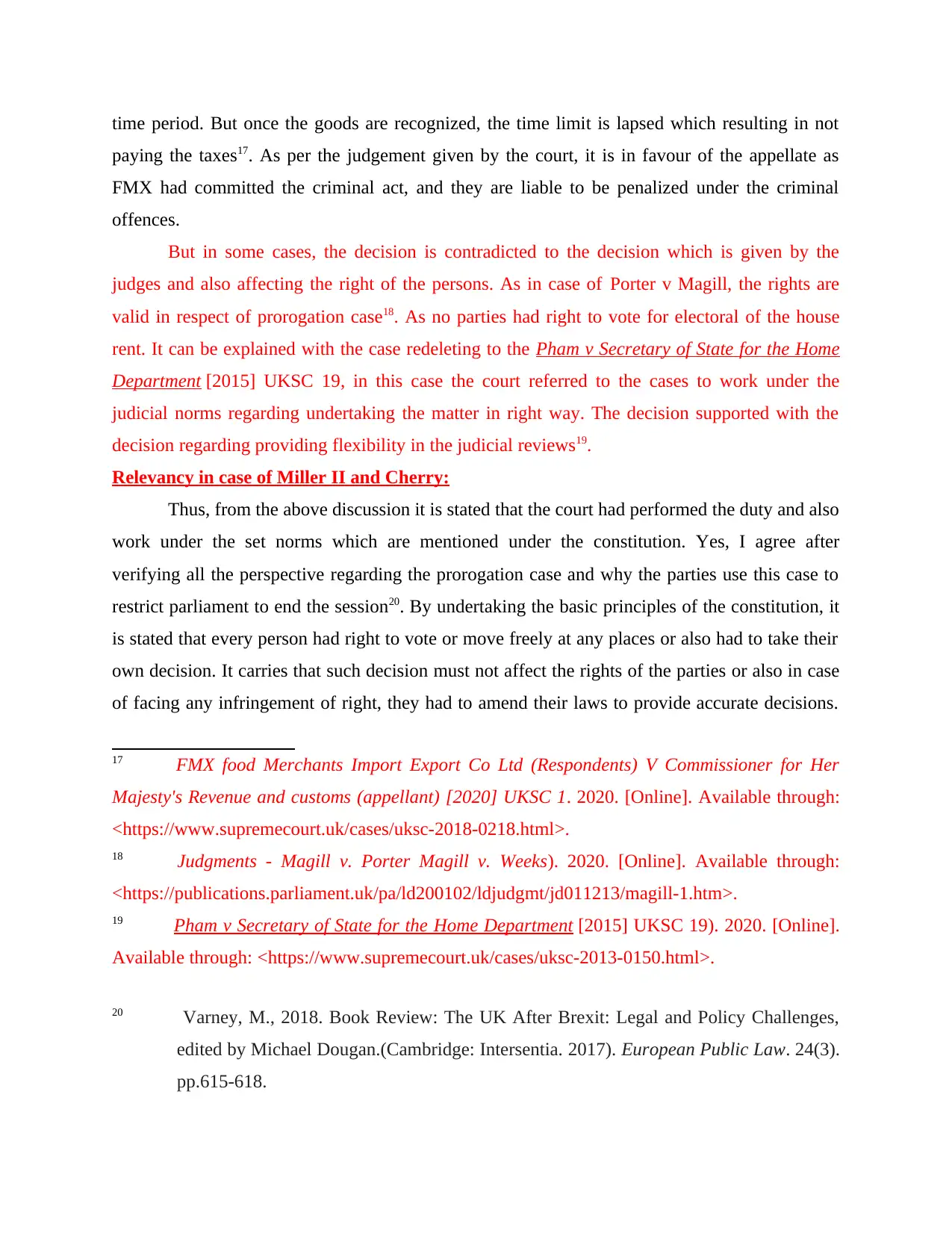
time period. But once the goods are recognized, the time limit is lapsed which resulting in not
paying the taxes17. As per the judgement given by the court, it is in favour of the appellate as
FMX had committed the criminal act, and they are liable to be penalized under the criminal
offences.
But in some cases, the decision is contradicted to the decision which is given by the
judges and also affecting the right of the persons. As in case of Porter v Magill, the rights are
valid in respect of prorogation case18. As no parties had right to vote for electoral of the house
rent. It can be explained with the case redeleting to the Pham v Secretary of State for the Home
Department [2015] UKSC 19, in this case the court referred to the cases to work under the
judicial norms regarding undertaking the matter in right way. The decision supported with the
decision regarding providing flexibility in the judicial reviews19.
Relevancy in case of Miller II and Cherry:
Thus, from the above discussion it is stated that the court had performed the duty and also
work under the set norms which are mentioned under the constitution. Yes, I agree after
verifying all the perspective regarding the prorogation case and why the parties use this case to
restrict parliament to end the session20. By undertaking the basic principles of the constitution, it
is stated that every person had right to vote or move freely at any places or also had to take their
own decision. It carries that such decision must not affect the rights of the parties or also in case
of facing any infringement of right, they had to amend their laws to provide accurate decisions.
17 FMX food Merchants Import Export Co Ltd (Respondents) V Commissioner for Her
Majesty's Revenue and customs (appellant) [2020] UKSC 1. 2020. [Online]. Available through:
<https://www.supremecourt.uk/cases/uksc-2018-0218.html>.
18 Judgments - Magill v. Porter Magill v. Weeks). 2020. [Online]. Available through:
<https://publications.parliament.uk/pa/ld200102/ldjudgmt/jd011213/magill-1.htm>.
19 Pham v Secretary of State for the Home Department [2015] UKSC 19). 2020. [Online].
Available through: <https://www.supremecourt.uk/cases/uksc-2013-0150.html>.
20 Varney, M., 2018. Book Review: The UK After Brexit: Legal and Policy Challenges,
edited by Michael Dougan.(Cambridge: Intersentia. 2017). European Public Law. 24(3).
pp.615-618.
paying the taxes17. As per the judgement given by the court, it is in favour of the appellate as
FMX had committed the criminal act, and they are liable to be penalized under the criminal
offences.
But in some cases, the decision is contradicted to the decision which is given by the
judges and also affecting the right of the persons. As in case of Porter v Magill, the rights are
valid in respect of prorogation case18. As no parties had right to vote for electoral of the house
rent. It can be explained with the case redeleting to the Pham v Secretary of State for the Home
Department [2015] UKSC 19, in this case the court referred to the cases to work under the
judicial norms regarding undertaking the matter in right way. The decision supported with the
decision regarding providing flexibility in the judicial reviews19.
Relevancy in case of Miller II and Cherry:
Thus, from the above discussion it is stated that the court had performed the duty and also
work under the set norms which are mentioned under the constitution. Yes, I agree after
verifying all the perspective regarding the prorogation case and why the parties use this case to
restrict parliament to end the session20. By undertaking the basic principles of the constitution, it
is stated that every person had right to vote or move freely at any places or also had to take their
own decision. It carries that such decision must not affect the rights of the parties or also in case
of facing any infringement of right, they had to amend their laws to provide accurate decisions.
17 FMX food Merchants Import Export Co Ltd (Respondents) V Commissioner for Her
Majesty's Revenue and customs (appellant) [2020] UKSC 1. 2020. [Online]. Available through:
<https://www.supremecourt.uk/cases/uksc-2018-0218.html>.
18 Judgments - Magill v. Porter Magill v. Weeks). 2020. [Online]. Available through:
<https://publications.parliament.uk/pa/ld200102/ldjudgmt/jd011213/magill-1.htm>.
19 Pham v Secretary of State for the Home Department [2015] UKSC 19). 2020. [Online].
Available through: <https://www.supremecourt.uk/cases/uksc-2013-0150.html>.
20 Varney, M., 2018. Book Review: The UK After Brexit: Legal and Policy Challenges,
edited by Michael Dougan.(Cambridge: Intersentia. 2017). European Public Law. 24(3).
pp.615-618.
Paraphrase This Document
Need a fresh take? Get an instant paraphrase of this document with our AI Paraphraser
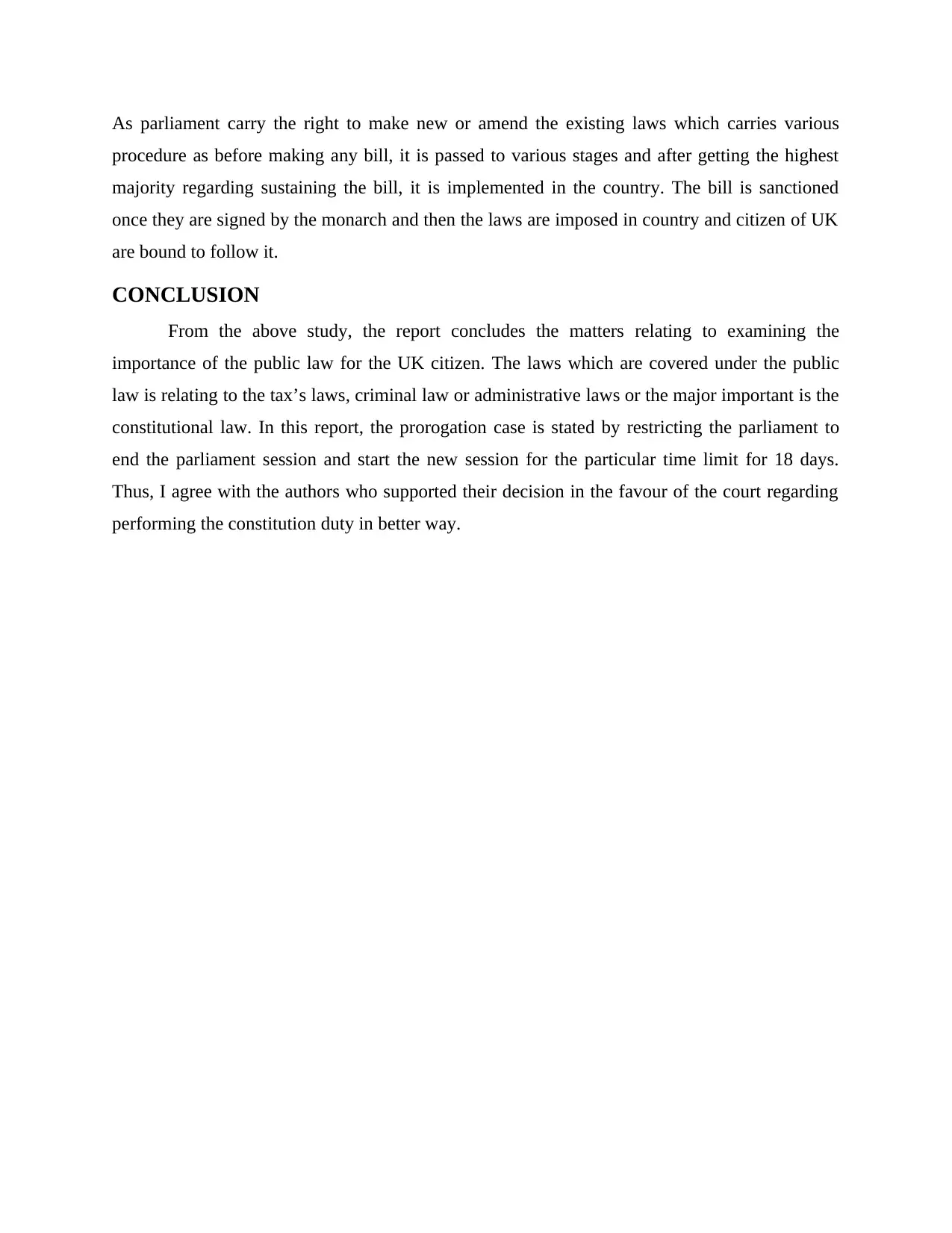
As parliament carry the right to make new or amend the existing laws which carries various
procedure as before making any bill, it is passed to various stages and after getting the highest
majority regarding sustaining the bill, it is implemented in the country. The bill is sanctioned
once they are signed by the monarch and then the laws are imposed in country and citizen of UK
are bound to follow it.
CONCLUSION
From the above study, the report concludes the matters relating to examining the
importance of the public law for the UK citizen. The laws which are covered under the public
law is relating to the tax’s laws, criminal law or administrative laws or the major important is the
constitutional law. In this report, the prorogation case is stated by restricting the parliament to
end the parliament session and start the new session for the particular time limit for 18 days.
Thus, I agree with the authors who supported their decision in the favour of the court regarding
performing the constitution duty in better way.
procedure as before making any bill, it is passed to various stages and after getting the highest
majority regarding sustaining the bill, it is implemented in the country. The bill is sanctioned
once they are signed by the monarch and then the laws are imposed in country and citizen of UK
are bound to follow it.
CONCLUSION
From the above study, the report concludes the matters relating to examining the
importance of the public law for the UK citizen. The laws which are covered under the public
law is relating to the tax’s laws, criminal law or administrative laws or the major important is the
constitutional law. In this report, the prorogation case is stated by restricting the parliament to
end the parliament session and start the new session for the particular time limit for 18 days.
Thus, I agree with the authors who supported their decision in the favour of the court regarding
performing the constitution duty in better way.
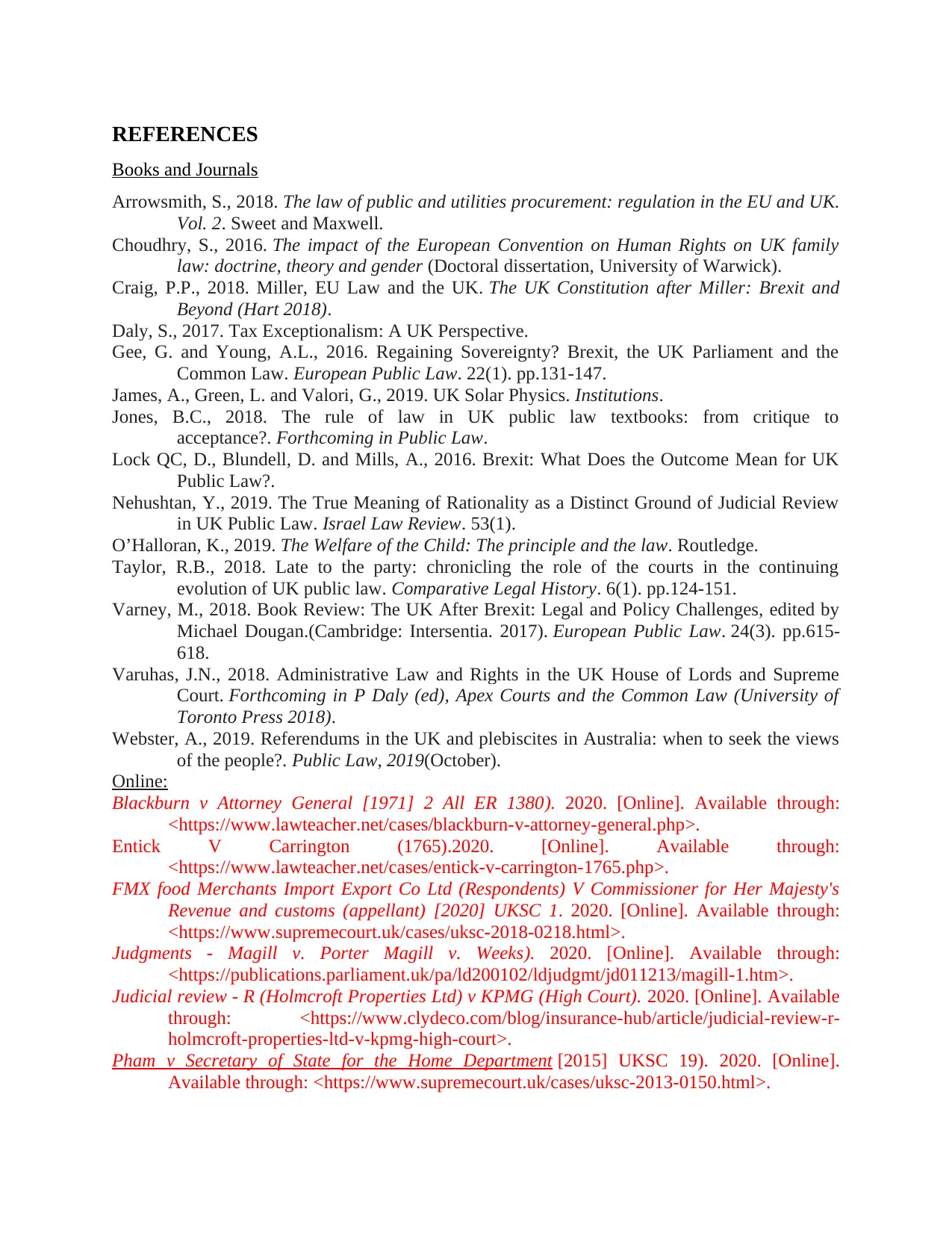
REFERENCES
Books and Journals
Arrowsmith, S., 2018. The law of public and utilities procurement: regulation in the EU and UK.
Vol. 2. Sweet and Maxwell.
Choudhry, S., 2016. The impact of the European Convention on Human Rights on UK family
law: doctrine, theory and gender (Doctoral dissertation, University of Warwick).
Craig, P.P., 2018. Miller, EU Law and the UK. The UK Constitution after Miller: Brexit and
Beyond (Hart 2018).
Daly, S., 2017. Tax Exceptionalism: A UK Perspective.
Gee, G. and Young, A.L., 2016. Regaining Sovereignty? Brexit, the UK Parliament and the
Common Law. European Public Law. 22(1). pp.131-147.
James, A., Green, L. and Valori, G., 2019. UK Solar Physics. Institutions.
Jones, B.C., 2018. The rule of law in UK public law textbooks: from critique to
acceptance?. Forthcoming in Public Law.
Lock QC, D., Blundell, D. and Mills, A., 2016. Brexit: What Does the Outcome Mean for UK
Public Law?.
Nehushtan, Y., 2019. The True Meaning of Rationality as a Distinct Ground of Judicial Review
in UK Public Law. Israel Law Review. 53(1).
O’Halloran, K., 2019. The Welfare of the Child: The principle and the law. Routledge.
Taylor, R.B., 2018. Late to the party: chronicling the role of the courts in the continuing
evolution of UK public law. Comparative Legal History. 6(1). pp.124-151.
Varney, M., 2018. Book Review: The UK After Brexit: Legal and Policy Challenges, edited by
Michael Dougan.(Cambridge: Intersentia. 2017). European Public Law. 24(3). pp.615-
618.
Varuhas, J.N., 2018. Administrative Law and Rights in the UK House of Lords and Supreme
Court. Forthcoming in P Daly (ed), Apex Courts and the Common Law (University of
Toronto Press 2018).
Webster, A., 2019. Referendums in the UK and plebiscites in Australia: when to seek the views
of the people?. Public Law, 2019(October).
Online:
Blackburn v Attorney General [1971] 2 All ER 1380). 2020. [Online]. Available through:
<https://www.lawteacher.net/cases/blackburn-v-attorney-general.php>.
Entick V Carrington (1765).2020. [Online]. Available through:
<https://www.lawteacher.net/cases/entick-v-carrington-1765.php>.
FMX food Merchants Import Export Co Ltd (Respondents) V Commissioner for Her Majesty's
Revenue and customs (appellant) [2020] UKSC 1. 2020. [Online]. Available through:
<https://www.supremecourt.uk/cases/uksc-2018-0218.html>.
Judgments - Magill v. Porter Magill v. Weeks). 2020. [Online]. Available through:
<https://publications.parliament.uk/pa/ld200102/ldjudgmt/jd011213/magill-1.htm>.
Judicial review - R (Holmcroft Properties Ltd) v KPMG (High Court). 2020. [Online]. Available
through: <https://www.clydeco.com/blog/insurance-hub/article/judicial-review-r-
holmcroft-properties-ltd-v-kpmg-high-court>.
Pham v Secretary of State for the Home Department [2015] UKSC 19). 2020. [Online].
Available through: <https://www.supremecourt.uk/cases/uksc-2013-0150.html>.
Books and Journals
Arrowsmith, S., 2018. The law of public and utilities procurement: regulation in the EU and UK.
Vol. 2. Sweet and Maxwell.
Choudhry, S., 2016. The impact of the European Convention on Human Rights on UK family
law: doctrine, theory and gender (Doctoral dissertation, University of Warwick).
Craig, P.P., 2018. Miller, EU Law and the UK. The UK Constitution after Miller: Brexit and
Beyond (Hart 2018).
Daly, S., 2017. Tax Exceptionalism: A UK Perspective.
Gee, G. and Young, A.L., 2016. Regaining Sovereignty? Brexit, the UK Parliament and the
Common Law. European Public Law. 22(1). pp.131-147.
James, A., Green, L. and Valori, G., 2019. UK Solar Physics. Institutions.
Jones, B.C., 2018. The rule of law in UK public law textbooks: from critique to
acceptance?. Forthcoming in Public Law.
Lock QC, D., Blundell, D. and Mills, A., 2016. Brexit: What Does the Outcome Mean for UK
Public Law?.
Nehushtan, Y., 2019. The True Meaning of Rationality as a Distinct Ground of Judicial Review
in UK Public Law. Israel Law Review. 53(1).
O’Halloran, K., 2019. The Welfare of the Child: The principle and the law. Routledge.
Taylor, R.B., 2018. Late to the party: chronicling the role of the courts in the continuing
evolution of UK public law. Comparative Legal History. 6(1). pp.124-151.
Varney, M., 2018. Book Review: The UK After Brexit: Legal and Policy Challenges, edited by
Michael Dougan.(Cambridge: Intersentia. 2017). European Public Law. 24(3). pp.615-
618.
Varuhas, J.N., 2018. Administrative Law and Rights in the UK House of Lords and Supreme
Court. Forthcoming in P Daly (ed), Apex Courts and the Common Law (University of
Toronto Press 2018).
Webster, A., 2019. Referendums in the UK and plebiscites in Australia: when to seek the views
of the people?. Public Law, 2019(October).
Online:
Blackburn v Attorney General [1971] 2 All ER 1380). 2020. [Online]. Available through:
<https://www.lawteacher.net/cases/blackburn-v-attorney-general.php>.
Entick V Carrington (1765).2020. [Online]. Available through:
<https://www.lawteacher.net/cases/entick-v-carrington-1765.php>.
FMX food Merchants Import Export Co Ltd (Respondents) V Commissioner for Her Majesty's
Revenue and customs (appellant) [2020] UKSC 1. 2020. [Online]. Available through:
<https://www.supremecourt.uk/cases/uksc-2018-0218.html>.
Judgments - Magill v. Porter Magill v. Weeks). 2020. [Online]. Available through:
<https://publications.parliament.uk/pa/ld200102/ldjudgmt/jd011213/magill-1.htm>.
Judicial review - R (Holmcroft Properties Ltd) v KPMG (High Court). 2020. [Online]. Available
through: <https://www.clydeco.com/blog/insurance-hub/article/judicial-review-r-
holmcroft-properties-ltd-v-kpmg-high-court>.
Pham v Secretary of State for the Home Department [2015] UKSC 19). 2020. [Online].
Available through: <https://www.supremecourt.uk/cases/uksc-2013-0150.html>.
⊘ This is a preview!⊘
Do you want full access?
Subscribe today to unlock all pages.

Trusted by 1+ million students worldwide
1 out of 13
Related Documents
Your All-in-One AI-Powered Toolkit for Academic Success.
+13062052269
info@desklib.com
Available 24*7 on WhatsApp / Email
![[object Object]](/_next/static/media/star-bottom.7253800d.svg)
Unlock your academic potential
Copyright © 2020–2026 A2Z Services. All Rights Reserved. Developed and managed by ZUCOL.





